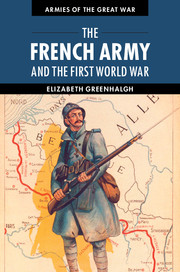Book contents
- Frontmatter
- Contents
- List of figures
- List of maps
- List of tables
- Preface
- List of abbreviations
- Introduction
- 1 The pre-war Army
- 2 1914: From the frontiers to Flanders
- 3 1915: On the offensive
- 4 1916: Verdun and the Somme
- 5 General Nivelle and his 1917 offensive
- 6 Restoring the Army
- 7 1918: German offensives
- 8 The path to victory
- 9 Armistices and demobilisation
- 10 From 1914 to 1919: Aux armes, citoyens!
- Notes
- Bibliographic essay
- Index
Preface
Published online by Cambridge University Press: 05 November 2014
- Frontmatter
- Contents
- List of figures
- List of maps
- List of tables
- Preface
- List of abbreviations
- Introduction
- 1 The pre-war Army
- 2 1914: From the frontiers to Flanders
- 3 1915: On the offensive
- 4 1916: Verdun and the Somme
- 5 General Nivelle and his 1917 offensive
- 6 Restoring the Army
- 7 1918: German offensives
- 8 The path to victory
- 9 Armistices and demobilisation
- 10 From 1914 to 1919: Aux armes, citoyens!
- Notes
- Bibliographic essay
- Index
Summary
Preface
More than eight million French citizens were mobilised during the fifty-two months of the First World War, and the principal battleground in Europe was Northern France, which was devastated as a result. In round figures, of those 8.4 million French soldiers, 1.4 million (including colonials and foreign volunteers) were killed or disappeared during the conflict. A further nine million wounded, gassed or ill men passed through the medical service, some of these, of course, figuring three or four times. Almost two million pensions were being paid to war-wounded veterans in December 1921, of whom 42,000 were blind in one or both eyes and 43,600 had lost either an arm or a leg. These figures exceed comparable statistics for the principal allies on the Western Front, although Russian figures are no doubt higher.
The French Army was fighting to defend home and country, unlike the British and Americans, who occasionally exasperated their ‘hosts’ by seeming to be prepared to fight to the last Frenchman. It is difficult to imagine the British Army fighting in England with the home counties occupied by the enemy, but enemy occupation is what drove not only those eight million Frenchmen to accept their duty to serve, but also their parents, wives and sisters to work in war factories. Yet, too often, the enormous effort of the French Army of 1914–18 is seen through the prism of 1940, all the more so because its Commander-in-Chief in 1917–18 was Philippe Pétain (who did not sign the 1918 armistice, but is counted responsible for that of 1940). Those volumes of the British official history dealing with 1918 reveal this tendency very clearly, and some American writing on the war reflects a similar tendency to imagine that effete Europeans required an infusion of transatlantic vigour to finish the war.
- Type
- Chapter
- Information
- The French Army and the First World War , pp. xi - xiiiPublisher: Cambridge University PressPrint publication year: 2014



